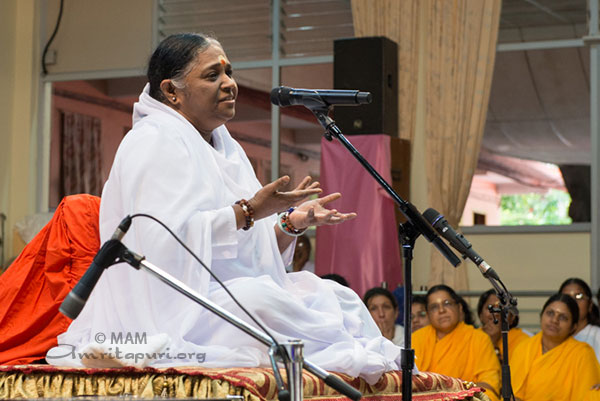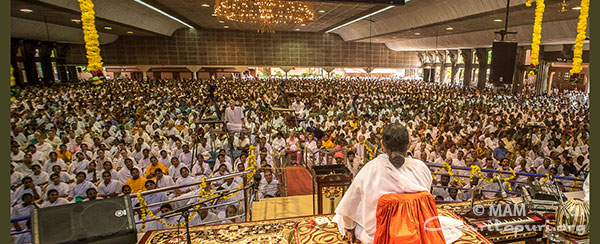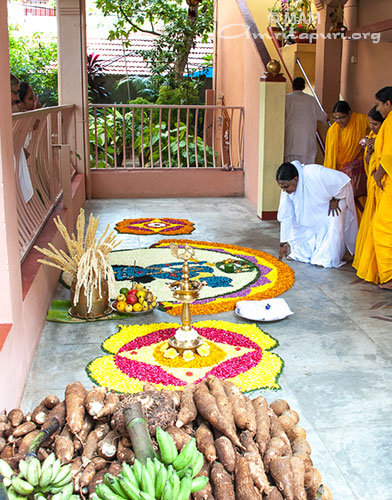7 September 2014 — Amritapuri Ashram
Extracted from Amma’s Onam satsang.
There are certain things in life towards which attraction never ends. These are the good things that awaken enthusiasm and freshness whenever we think about or experience them. For example, the sea. No matter how many times we look at the sea, we never feel it’s enough. There is an aspect of eternity in the sea. It’s the same with the sky. The bonds we feel with the place where we were born and towards Nature in general are also like this. We always see newness in them. It’s the same with the bond and attraction we feel towards Onam.

There is something in Onam that touches and awakens goodness and happiness in us. For a Malayali*, the mere thought of Onam awakens enthusiasm and feelings of celebration. Maybe we feel this attraction because of how intertwined Onam is with our eternal culture and Nature itself.
Certain aspects of Onam are unique. It is a chain that links together the past, the present and the future. We celebrate Onam to remember the good times that have been lost to antiquity—memories of an age when prosperity, equality and brotherhood prevailed. Onam also awakens expectations for the return of such an age in the future. Onam belongs to the present as well because when we celebrate it we forget everything and live in the here and now.

At the same time, Onam is not just an occasion to celebrate and enjoy. It’s also an occasion to remind us of the importance of certain values: the importance of sharing, of protecting Nature, of humility and self-sacrifice, the importance of surrendering ourselves to God, the importance of being charitable and of performing our actions in a spirit of yajna. These are some of what Onam teaches us. In fact, questions like “Did Mahabali really exist?” and “Was there even a Kerala in Mahabali’s time?” are not that relevant. The important things are the values and teachings that Onam conveys. Our celebration of Onam will only truly become meaningful when we put in effort to firmly imbibe these values in our life.
In our country, festivals are not mere occasions for celebrating and enjoying. They are means to help us transform every aspect of our personal and social lives into things that will advance us towards Self-realization. More than being for our enjoyment, their aim is to help us spread dharma, values and the remembrance of God in society. It’s painful for Amma when she sees how far people are straying from this goal. Worse yet, the tendency to use festivals like Onam as mere occasions to drink and make merry is increasing every year.
Even though Mahabali was a very good person, he had some shortcomings. His attitude was, “I’m a great emperor. I’m the ruler of the three worlds. No one does as much good as I do.” In reality, we do not have any power of our own. Mahabali did not understand that it is only because of divine grace that we are able to accomplish anything. Vamana asked Mahabali for three feet of land. Mahabali replied, “I’m the owner of the three worlds. Don’t ask me for such trivial things. Ask for anything, and it will be given to you.” This is the attitude many develop when they start gaining fame, position and prosperity in life. It’s not enough if we perform good actions; we have to do so humbly, without ego. Remember, even Olympic champions have to lower their heads when standing on the podium to receive their medals.
When someone writes a great book, can the pen claim any greatness? If a judge sentences someone to be hanged, is the pen responsible for the verdict? No, the pen is just an instrument. We should be aware that, similarly, we are all just instruments in God’s hands.

The Onam festival is an expression of unity. When everyone comes together to draw and decorate the pookkalams, to cook the feast, to take part in the Onam dances and games, all differences fade away. Unity is the pillar of progress and harmony in society. It is not enough if we are united on Onam. We need to be able to abide in such ideals throughout our lives. But what we see in today’s society is only selfishness and self-imposed segregation.
Onam is also a celebration that reminds us of our dharma towards Mother Nature. Not so long ago, the Onam pookkalams were decorated with so many varieties of flowers. Thumba, thechi, mandaram, hibiscus, jasmine and many other varieties of flowers could easily be found around many of the houses. But in recent times flowers are seen less and less. As such, we see people using colored powder, coconut flakes and sawdust to color their pookkalams. Soon, we may even see pookkalams made of plastic flowers. These may be colorful, but they will lack the beauty and fragrance of real flowers. In olden times, nearly every house had a swing. Now the tree on which the swing was tied has disappeared. Today, in order to sit on a swing, children have to go to a park. To prevent such situations, we have to put in dedicated effort with the spirit of unity.
Let us try our best and leave the rest to God’s will.
—-
* Malayali – One who speaks Malayalam, the language of Kerala state.
